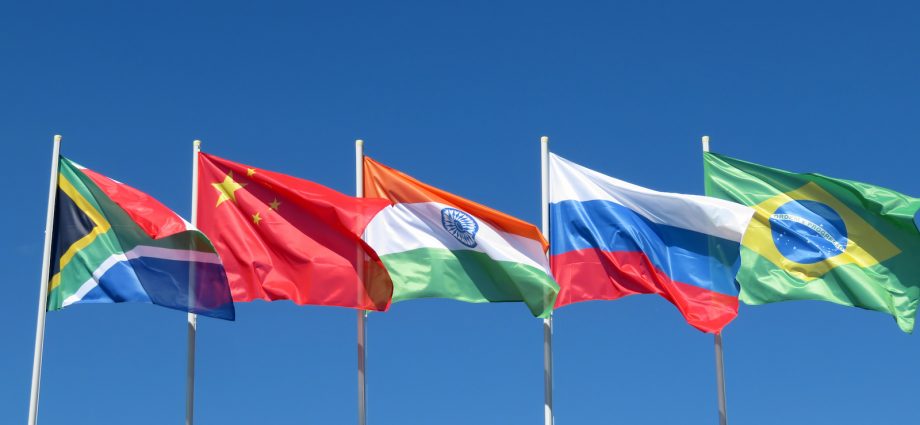
The potential expansion of the BRICS group of nations could fundamentally transform the future of global alliances, but it will likely fall flat.
BRICS is an acronym for its member countries, Brazil, Russia, India, China and South Africa. The countries created an alliance as a counterweight to similar Western partnerships in 2009.
Since South Africa gained entry in 2010, there has been a constant debate about expanding the bloc to include more countries from the emerging world. The expansion debate recently kicked into high gear but reveals more about China’s foreign-policy interests than those of the BRICS.
The original and ongoing challenge facing the BRICS remains the ability of emerging-market economies to create institutions that compete with Western counterparts successfully.
Including more members won’t bring the objectives any closer. South Africa’s ambassador to the bloc confirmed that the BRICS would decide this year on whether to admit new members and by which criteria.
Saudi Arabia and Iran have formally asked to join the group along with countries like Argentina. Renewed interest in expanding the group of nations took shape last year while China was the chair nation.
There is precedent for including new members without changing the delicate relations between member countries. The New Development Bank, which BRICS created as a counterweight to the International Monetary Fund and the World Bank, has already included several countries outside the founding nations. Bangladesh and the United Arab Emirates joined the bank in 2021. Egypt and Uruguay are expected to be admitted soon.
But joining the bank to facilitate transactions is different from joining the bloc as a full member. According to one economist interviewed by Bloomberg, there is little economic logic in expanding the bloc at this stage because there is no clear collective purpose. Without clear objectives regarding trade, health, green energy, and other issues, there is little point in adding new members.
This hasn’t stopped the list of interested countries from growing. The UAE, Algeria, Egypt, Bahrain, Indonesia and several African nations have expressed strong interest in membership.
If there is little economic sense to be found in opening membership at the moment, what is driving the debate about including new countries? The answer is China.
As home to the largest economy in the group, there is concern in the West and among China’s rivals that Beijing is using its power to push for the inclusion of nations that will ultimately erode other countries’ influence. Moreover, the expansion push is being understood by some analysts as part of China’s new foreign policy whereby it uses alliances and partnerships to achieve its goal instead of its own dwindling capital.
Last year, China began a major new push into the Middle East, with President Xi Jinping traveling to Saudi Arabia. On the trip, Beijing elevated its partnership with Saudi Arabia to a “comprehensive strategic partnership,” the highest level in China’s foreign relations.
According to The Wall Street Journal, the closeness of the relationship is being used to strengthen the case for Saudi Arabia to join China-led multilateral frameworks such as BRICS and the Shanghai Cooperation Organization.
China’s economic prospects are dwindling in the short and medium terms. Slowing global growth and a spike in Covid-related lockdowns have badly hurt the Chinese economy and its growth forecast. The economic pain has forced the country to rethink its foreign spending and policy objectives.
The Belt and Road Initiative (BRI), one of Beijing’s special foreign-policy projects, has seen dramatic spending cuts and a rare public reassessment of objectives.
Despite these setbacks, China remains one of the world’s superpowers and has plenty of options to advance its foreign-policy objectives. Using its influence in multilateral organizations like the BRICS grouping is a relatively cheap and effective way to assert its power on the global stage.
The only problem is that BRICS has never effectively achieved any concrete objectives, and its plans are unclear. China might want to remake the bloc of nations in its image, but it will still face the challenge of outlining clear objectives and finding the capital to achieve them.
Consider the tantalizing headlines that Saudi Arabia and Iran are both seeking membership in BRICS. The prospect of these two rivals joining the same multilateral organization designed to advance the economic prosperity of all member nations seems like science fiction.
One would assume that tensions would need to be eased to a degree for the economic partnership within BRICS to develop fully. Stranger things have happened, but given the tensions in the region, this reality appears far off.
This possibility begins to make sense if we look at this situation from China’s point of view. With China aggressively courting Saudi Arabia away from its deep relationship with the West, it makes perfect sense for China to align the country with its other partners, such as Iran. Breaking down the conflict between Saudi and Iran so that both countries would align with China would amount to a historic coup of statecraft.
It’s doubtful this could happen. Even though there have been talks between Riyadh and Tehran in recent years, they remain far apart in terms of Iranian foreign policy in the region, stumbling US attempts to restart the nuclear deal, and United States’ and Israel’s interest in maintaining a regional front against Iran.
But the thought experiment does explain China’s objectives in BRICS. The bloc is in theory an ideal vessel to carry out such a geopolitical coup.
Ultimately, BRICS still hasn’t lived up to its mandate, and it is fast becoming an empty vessel for the foreign-policy objectives of its most influential members. Including more member nations would only entrench this sad reality.
This article was provided by Syndication Bureau, which holds copyright.

